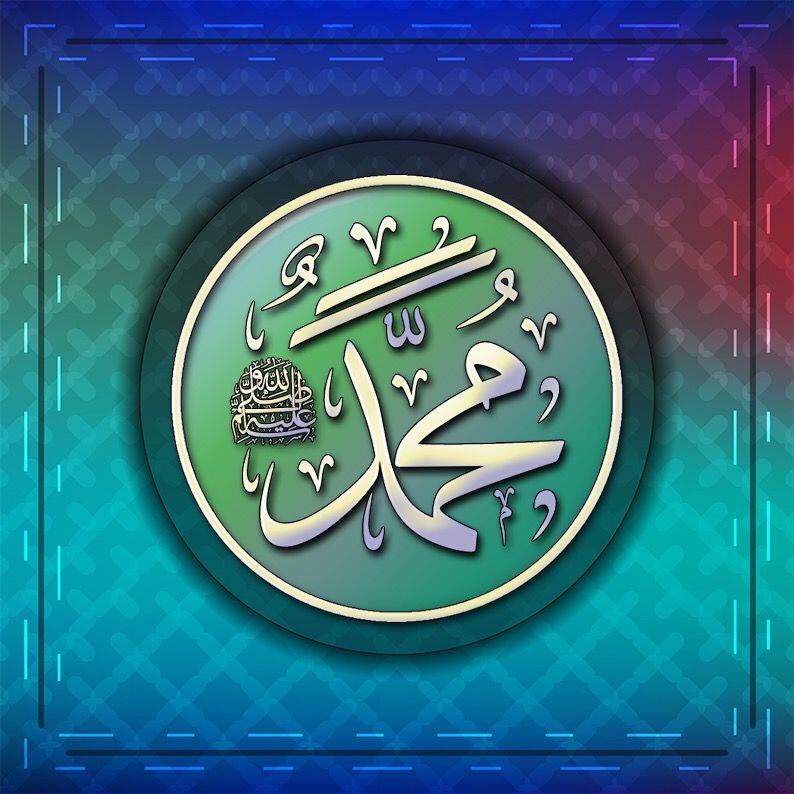
Qu’est-ce le madad? (Demander le support) – Est-ce que vous adorez la Ka’bah?
Des réalités de Maulana (Q) tel qu’enseigné par Shaykh Nurjan Mirahmadi
A’udhu Billahi Minash Shaitanir Rajeem
Bismillahir Rahmanir Raheem
Je cherche refuge en Allah contre le diable banni
Au Nom d’Allah, le Tout Miséricordieux, le Trés Miséricordieux
Le Prophète ﷺ craignait le Shirk caché (polythéisme) pour sa Nation
 … Sont-ils des adorateurs de pierres? Mais non – Vous savez par l’étude de votre foi et par l’étude de vos pratiques, c’est un isharat, c’est un signe que vous vous tournez simplement vers la Kabah – mais notre adoration est toujours pour Allah (AJ).
… Sont-ils des adorateurs de pierres? Mais non – Vous savez par l’étude de votre foi et par l’étude de vos pratiques, c’est un isharat, c’est un signe que vous vous tournez simplement vers la Kabah – mais notre adoration est toujours pour Allah (AJ).
Nous ne sommes pas adorateurs d’idole, et le Prophète ﷺ ne craignait pas l’idolatrie pour sa nation. Ce qu’il craignait le plus était le shirk caché (polythéisme), pas le shirk apparent qui est de croire que l’on se trouve devant Allah (AJ) sous forme de la Ka’bah et que nous allons donc nous prosterner devant elle. [hds]
Donc cela signifie que tout ce que veut shaitan c’est créer une confusion. Donc avec le plus sacré des signes pour nous, shaitan vient dire qu’ils se prosternent devant elle. Le Prophète ﷺ clarifie, les 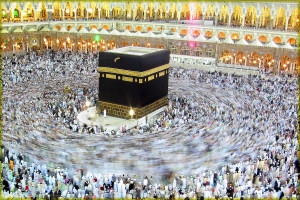 Awliyaullah clarifient, les savants d’Ahlul Sunnah wa Jammah clarifient que, ‘non, non, non, vous ne vous prosternez devant elle. Votre adoration est uniquement pour Allah (AJ), vous utilisez seulement la Ka’bah comme une direction dans laquelle s’unifie toute la création. Tout doit faire face au noyau.’ Nous trouvons cette vérité même dans un atome – en science. La terre fait face au soleil ; les électrons font face au noyau. Donc nous aussi faisons face au centre de notre être, et l’adoration est seulement pour Allah (AJ). Alors ils commencent à clarifier que tout a un océan de compréhension.
Awliyaullah clarifient, les savants d’Ahlul Sunnah wa Jammah clarifient que, ‘non, non, non, vous ne vous prosternez devant elle. Votre adoration est uniquement pour Allah (AJ), vous utilisez seulement la Ka’bah comme une direction dans laquelle s’unifie toute la création. Tout doit faire face au noyau.’ Nous trouvons cette vérité même dans un atome – en science. La terre fait face au soleil ; les électrons font face au noyau. Donc nous aussi faisons face au centre de notre être, et l’adoration est seulement pour Allah (AJ). Alors ils commencent à clarifier que tout a un océan de compréhension.
Demander le Madad (chercher le support) ne signifie PAS adoration
 Quand vous demandez le madad, c’est demander les ulul amr (les guides spirituels); dont Allah (AJ) nous dit, ‘vous obéissez à Allah – Ati Allah, Ati rasul, wa ulul amri minkum.‘ (Qur’an, 4:59). Les Ulul amr, “wa kunu ma’as Sadiqeen,” cet itaqala, ‘ayez conscience d’Allah (AJ),’ “wa kunu ma’as Sadiqeen,” (Qur’an, 9:119), et ‘gardez la compagnie des sadiqeen.’
Quand vous demandez le madad, c’est demander les ulul amr (les guides spirituels); dont Allah (AJ) nous dit, ‘vous obéissez à Allah – Ati Allah, Ati rasul, wa ulul amri minkum.‘ (Qur’an, 4:59). Les Ulul amr, “wa kunu ma’as Sadiqeen,” cet itaqala, ‘ayez conscience d’Allah (AJ),’ “wa kunu ma’as Sadiqeen,” (Qur’an, 9:119), et ‘gardez la compagnie des sadiqeen.’
ياأَيُّهَا الَّذِينَ آمَنُوا أَطِيعُواللَّه وَأَطِيعُوٱلرَّسُولَ وَأُوْلِي الْأَمْرِ مِنْكُمْ
4:59 – “Ya ayyu hal latheena amanoo Atiullaha wa atiur Rasula wa Ulil amre minkum…“ (Surat an-Nisa)
“O vous qui croyez, Obéissez à Allah, obéissez au Messager, et à ceux d’entre vous qui détiennent le commandement… “(Les Femmes, 4:59)
يَا أَيُّهَا الَّذِينَ آمَنُوا اتَّقُوا اللّهَ وَكُونُوا مَعَ الصَّادِقِينَ ١١٩
9:119 – “Ya ayyuhal ladheena amanoo ittaqollaha wa kono ma’as sadiqeen.” (Surat at Tawba)
“O vous qui avez la foi, ayez conscience d’Allah et soyez avec ceux qui sont véridiques/ Pieux /sincère (en paroles et en actes).” (Le Repentir, 9:119)
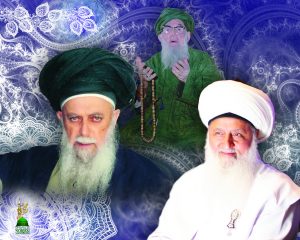 Les Sincères, et les serviteurs véridiques, ils sont à la fois vivants et al Hayyu al Qayyum (toujours vivant et auto subsistant). Ils sont de ceux qui sont physiquement parmi vous – vous devez garder leur compagnie dans la vie – et spirituellement, ils ne sont pas morts dans leur tombes. Allah (AJ) le dit dans le Saint Quran et le Prophète ﷺ décrit qu’ils sont vivants dans leurs tombes.
Les Sincères, et les serviteurs véridiques, ils sont à la fois vivants et al Hayyu al Qayyum (toujours vivant et auto subsistant). Ils sont de ceux qui sont physiquement parmi vous – vous devez garder leur compagnie dans la vie – et spirituellement, ils ne sont pas morts dans leur tombes. Allah (AJ) le dit dans le Saint Quran et le Prophète ﷺ décrit qu’ils sont vivants dans leurs tombes.
وَلَا تَحْسَبَنَّ الَّذِينَ قُتِلُوا فِي سَبِيلِ اللَّـهِ أَمْوَاتًا ۚ بَلْ أَحْيَاءٌ عِندَ رَبِّهِمْ يُرْزَقُونَ ١٦٩
3:169 -Wa la tahsabanna alladheena qutilo fee sabilillahi amwatun, bal ahyaon ‘inda rabbihim yurzaqoon. (Surat Ali Imran)
“Ne pense pas que ceux qui ont été tués dans le sentier d’Allah, soient morts. Au contraire, ils sont vivants, auprès de leur Seigneur, bien pourvus” (Famille d’Imran, 3:169)
Ainsi si tu les appelle, leurs âmes viennent pour être présent avec toi. Non pas pour être un “Allah”, et non pas pour être adoré. Vous ne les adorez pas, et vous ne vous prosternez pas devant eux – de la même façon que vous n’adorez pas la Ka’bah, et que vous ne vous prosternez pas devant la Ka’bah. Parce que si vous vous prosternez devant la ka’bah vous êtes un mushrik (polythéiste). Cela signifie que vous devez élever votre pensée au delà de ce niveau.
Dans la Prière, nous donnons le Salaam au Prophète ﷺ et aux pieux serviteurs d’Allah (ibadullahi as saliheen)
Donc quand nous savons que nous ne nous prosternons pas, mais que nous demandons à réaliser complètement notre religion, alors Allah (AJ) dis, ‘vous devez être avec les ulul amr,’ alors vous devez ‘garder la compagnie des pieux serviteurs,’ (Quran 9:119), que ce soit  physiquement ou spirituellement, vous devez être toujours avec eux. Alors qu’est ce qu’ Allah (AJ), vous fait dire dans votre salat (prière quotidienne), avant de fermer votre prière? “As Salamu alaika…” nous l’avons dit à maintes reprises, c’est une pierre angulaire de notre croyance – que dans la prière, avant que vous fermiez la prière, vous dites, “As Salamu Alaika Ayyuhan Nabi.” ‘La paix soit avec toi O Prophète ﷺ’, au temps présent. Le Prophète ﷺ doit donc être devant nous, nous regardant, parce que vous ne pouvez pas dire, “As Salamu Alaika” à l’arrière de sa tête (alayhi salatu salam), ce n’est pas adab. Pourquoi Allah (AJ) voudrait que vous donniez le salatu salam au dos du Prophète ﷺ? Donc vous devez être faisant votre salat et le Prophète ﷺ vous regardant, parce que vous dites et donnez votre témoignage. Pourquoi Allah (AJ) a-t-il conçu la prière ainsi, pour vous de dire, “As Salamu Alaika Ayyuhan Nabi, wa As Salamu Alaikum ya Ibadullahi Saliheen” ‘la paix soit sur toi O prophète et la paix soit sur vous tous pieux/vertueux serviteurs d’Allah’. Même dans la prière, Allah (AJ) dit que vous devez être dans la présence du Prophète ﷺ, et des ibadullahi as saliheen.
physiquement ou spirituellement, vous devez être toujours avec eux. Alors qu’est ce qu’ Allah (AJ), vous fait dire dans votre salat (prière quotidienne), avant de fermer votre prière? “As Salamu alaika…” nous l’avons dit à maintes reprises, c’est une pierre angulaire de notre croyance – que dans la prière, avant que vous fermiez la prière, vous dites, “As Salamu Alaika Ayyuhan Nabi.” ‘La paix soit avec toi O Prophète ﷺ’, au temps présent. Le Prophète ﷺ doit donc être devant nous, nous regardant, parce que vous ne pouvez pas dire, “As Salamu Alaika” à l’arrière de sa tête (alayhi salatu salam), ce n’est pas adab. Pourquoi Allah (AJ) voudrait que vous donniez le salatu salam au dos du Prophète ﷺ? Donc vous devez être faisant votre salat et le Prophète ﷺ vous regardant, parce que vous dites et donnez votre témoignage. Pourquoi Allah (AJ) a-t-il conçu la prière ainsi, pour vous de dire, “As Salamu Alaika Ayyuhan Nabi, wa As Salamu Alaikum ya Ibadullahi Saliheen” ‘la paix soit sur toi O prophète et la paix soit sur vous tous pieux/vertueux serviteurs d’Allah’. Même dans la prière, Allah (AJ) dit que vous devez être dans la présence du Prophète ﷺ, et des ibadullahi as saliheen.
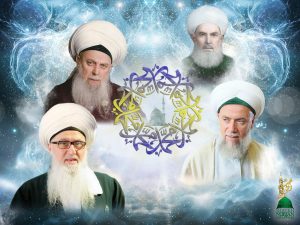 Donc toute notre vie demande après ce madad, que le madad du Prophète ﷺ soit avec nous, que les Compagnons du Prophète ﷺ soient avec nous, que les Awliyaullah soient avec nous, eux dont Allah (AJ) est satisfait qu’ils soient avec nous, physiquement et spirtuellement. C’est même dans notre salat, Allah (AJ) dit vous devriez les visualiser et les voir. Si vous ne les voyez pas, sachez qu’ils vous voient, parce que la prière au maqam al-ihsan (la station de l’excellence) et de la perfection.
Donc toute notre vie demande après ce madad, que le madad du Prophète ﷺ soit avec nous, que les Compagnons du Prophète ﷺ soient avec nous, que les Awliyaullah soient avec nous, eux dont Allah (AJ) est satisfait qu’ils soient avec nous, physiquement et spirtuellement. C’est même dans notre salat, Allah (AJ) dit vous devriez les visualiser et les voir. Si vous ne les voyez pas, sachez qu’ils vous voient, parce que la prière au maqam al-ihsan (la station de l’excellence) et de la perfection.
Les pieux serviteurs attestent Seyyidina Muhammad ﷺ dans leur Salah
Le Prophète ﷺ décrit que, ‘votre prière est que vous devriez prier comme si vous voyiez Allah (AJ) parce que si vous ne voyez pas Allah (AJ), sachez que Lui vous voit.’ Donc cela signifie que la station de l’ouverture du cœur et de l’attestation du cœur, quand la prière devient réelle, vous commencez à témoignez de ce que vous dites. Cette prière est réelle.
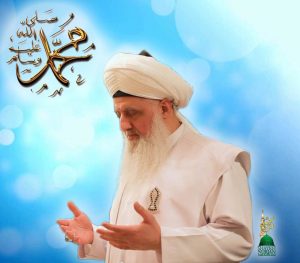 فَأَخْبِرْنِي عَنْ الْإِحْسَانِ، قَالَ: أَنْ تَعْبُدَ اللَّهَ كَأَنَّك تَرَاهُ، فَإِنْ لَمْ تَكُنْ تَرَاهُ فَإِنَّهُ يَرَاك
فَأَخْبِرْنِي عَنْ الْإِحْسَانِ، قَالَ: أَنْ تَعْبُدَ اللَّهَ كَأَنَّك تَرَاهُ، فَإِنْ لَمْ تَكُنْ تَرَاهُ فَإِنَّهُ يَرَاك
Qala Fa akhberni ‘an al Ihsan.
Qala: An Ta’bud Allaha, Ka annaka tarahu, fa in lam takun tarahu fa innahu yarak.
Maintenant, parle moi de l’excellence spirituelle (ihsan).
Le Prophète ﷺ répondit, “C’est de servir/adorer Allah comme si tu Le contemplais/voyais; et si tu ne Le contemples/vois pas, sache que certainement IL te voit.” Prophète Muhammad ﷺ
Les gens de ‘coeur ouvert’, quand ils font leur salat, leur cœur est ouvert et ils témoignent du Prophète ﷺ en leur âme, ils attestent des âmes pieuses des pieux prédecesseurs.
Cours à la Caverne de Sécurité, comme Ashab Kahf (les Dormants de la caverne)
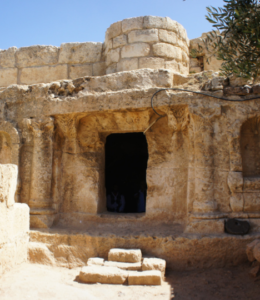 Alors Allah (AJ) nous donne différents exemples dans le Saint Qur’an, pourquoi Ashab al Kahf (Dormants de la Caverne) et la Surah al Kahf (la Caverne, 18ème Surah du Qur’an) est si importante dans la voie de la ma’rifah ?
Alors Allah (AJ) nous donne différents exemples dans le Saint Qur’an, pourquoi Ashab al Kahf (Dormants de la Caverne) et la Surah al Kahf (la Caverne, 18ème Surah du Qur’an) est si importante dans la voie de la ma’rifah ?
La caverne représente la caverne de Rahmah, et Ashab al Kahf est une réalité éternelle. Que toute votre vie – toute notre vie – nous devons fuir l’ignorance et nous précipiter vers la Rahmah d’Allah (miséricorde d’Allah). Et ce dunya est toujours sous le royaume de shaitan (satan), et nous devons chercher refuge auprés de Rahman (Le Plus Miséricordieux). Donc dans cette Surah, Allah (AJ) décrit que, ‘vous devez vous chercher vous même dans la caverne pour que je puisse vous marquer ou vous vétir de Rahmah.
﴾وَإِذِ اعْتَزَلْتُمُوهُمْ وَمَا يَعْبُدُونَ إِلَّا اللَّـهَ فَأْوُوا إِلَى الْكَهْفِ يَنشُرْ لَكُمْ رَبُّكُم مِّن رَّحْمَتِهِ وَيُهَيِّئْ لَكُم مِّنْ أَمْرِكُم مِّرْفَقًا ﴿١٦
18:16 “Wa idhi’ tazaltumo hum wa ma ya’budoona illAllaha fawoo ilal kahfi yanshur lakum rabbukum mir rahmatihi wa yuhayyi lakum min amrikum mirfaqa.” (Surat al Kahf)
“Et quand vous vous serez séparés d’eux et de ce qu’ils adorent en dehors d’Allah, réfugiez vous donc dans la caverne: votre Seigneur répandra de Sa miséricorde sur vous et disposera pour vous un adoucissement à votre sort.” (La Caverne, 18:16)
Musa Kalimullah (as) demandait la connaissance et suivi Seyyidina Khidr (as)
Et un autre exemple important dans cette Surah est l’exemple de 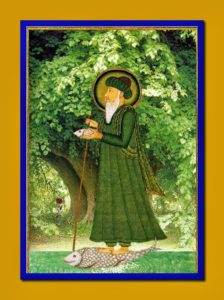 Sayyidina Khidr (as) et Nabi Musa (Moïse) (as). Qu’ils commencent à enseigner que Kalimullah, celui qui parle à Allah (AJ), il est encore dans le besoin de quelque chose – alors pourquoi Allah (AJ) n’enseigne pas à Musa (as) directement? Il est Kalimullah. Parce qu’Allah (AJ) veut à travers l’humilité que, ‘non, tu n’es pas le plus haut, juste parce que tu es Kalimullah, il y en a qui ont été enseignés par Ma Présence Divine, qui ont atteint une Rahmah, ‘et nous lui avions enseignés ilmalladuni‘ (Qur’an, 18:65). Ensuite il fut dit à Nabi Musa (as) d’aller là où les deux rivières se rencontrent, pour rencontrer un de ces serviteurs.
Sayyidina Khidr (as) et Nabi Musa (Moïse) (as). Qu’ils commencent à enseigner que Kalimullah, celui qui parle à Allah (AJ), il est encore dans le besoin de quelque chose – alors pourquoi Allah (AJ) n’enseigne pas à Musa (as) directement? Il est Kalimullah. Parce qu’Allah (AJ) veut à travers l’humilité que, ‘non, tu n’es pas le plus haut, juste parce que tu es Kalimullah, il y en a qui ont été enseignés par Ma Présence Divine, qui ont atteint une Rahmah, ‘et nous lui avions enseignés ilmalladuni‘ (Qur’an, 18:65). Ensuite il fut dit à Nabi Musa (as) d’aller là où les deux rivières se rencontrent, pour rencontrer un de ces serviteurs.
﴾فَوَجَدَا عَبْدًا مِّنْ عِبَادِنَا آتَيْنَاهُ رَحْمَةً مِّنْ عِندِنَا وَعَلَّمْنَاهُ مِن لَّدُنَّا عِلْمًا ﴿٦٥
18:65 – “Fawajada ‘abdan min ‘ibadinaa ataynahu rahmatan min ‘indina wa ‘allamnahu mil ladunna ‘ilma” (Surat al Kahf)
“Ils trouvèrent l’un de nos serviteurs à qui Nous avions donné une grâce, de Notre part, et à qui Nous avions enseigné une science de l’invisible/du ciel émanant de Notre Présence…” (La Caverne, 18:65)
Cela signifie pour nous, c’est une compréhension, encore, la compréhension du madad; Que vous demandez à accéder à des réalités, nous demandons à atteindre aux compréhensions. Et Allah (AJ) dit que, ‘même un Prophète Je l’ai fait chercher et trouver quelqu’un, et se montrer dans le besoin de connaissance.’ et que celui-ci n’était pas Prophète – certains disent qu’il était Prophète, d’autres disent que non – mais les connaissances célestes lui (Khidr (as)) avait été enseignées, connaissances célestes et réalités. Ensuite directement aprés cette Surah, alors Allah (AJ) nous donne une autre compréhension dans le maqam de Sadatina Maryam (Marie) (as).
Tout cela a à voir avec être en compagnie des rijalullah, les gens du Divin. Quand vous demandez leur madad, ils ne viennent pas pour être “Allah” pour vous, ils viennent avec une bénédiction, avec une rahmah (miséricorde). Que leur lumière et leurs âmes sont ouvertes, et Allah (AJ) est avec eux, la main d’Allah (AJ) est sur eux, le regard d’Allah (AJ) les habille.
وَمَن يُطِعِ اللّهَ وَالرَّسُولَ فَأُوْلَـئِكَ مَعَ الَّذِينَ أَنْعَمَ اللّهُ عَلَيْهِم مِّنَ النَّبِيِّينَ وَالصِّدِّيقِينَ وَالشُّهَدَاء وَالصَّالِحِينَ وَحَسُنَ أُولَـئِكَ رَفِيقًا
4:69 – “Wa man yuti’ Allaha war Rasola faolayeka ma’al ladheena an’ama Allahu ‘alayhim minan Nabiyeena, was Siddiqeena, wash Shuhadai, was Saliheena wa hasuna olayeka rafeeqan” (Surat An Nisa)
“Quiconque obéit à Allah et au messager…ceux là seront avec ceux qu’Allah a comblés de ses bienfaits: les prophètes, les véridiques, les martyrs, et les vertueux. Et quels bons compagnons que ceux-là. (Les Femmes, 4:69)
Soyez humbles, le Prophète Zakariya (as) vint au maqam de Sadatina Maryam (as) pour Du’a
 La barakah d’Allah (AJ) déborde sur eux, tellement que Sayyidina Zakariya (as) – il est Prophète mais sa du’a ne vient pas, sa Du’a n’a pas reçu de réponse, 90 années, sa du’a n’a pas reçu de réponse. Donc que nous donne Allah comme exemple? ‘Va au maqam d’une femme,’ – une femme au temps des Bani Israïl n’avait pas la moindre valeur. Pas comme dans la Ummata Muhammad ﷺ qui lui donna tellement de valeur. Allah (AJ) donne cette référence dans le temps, que pour un Nabi (as), ‘va dans le maqam.’ Il va dans le maqam d’une pieuse servante- Elle n’est pas Prophète.
La barakah d’Allah (AJ) déborde sur eux, tellement que Sayyidina Zakariya (as) – il est Prophète mais sa du’a ne vient pas, sa Du’a n’a pas reçu de réponse, 90 années, sa du’a n’a pas reçu de réponse. Donc que nous donne Allah comme exemple? ‘Va au maqam d’une femme,’ – une femme au temps des Bani Israïl n’avait pas la moindre valeur. Pas comme dans la Ummata Muhammad ﷺ qui lui donna tellement de valeur. Allah (AJ) donne cette référence dans le temps, que pour un Nabi (as), ‘va dans le maqam.’ Il va dans le maqam d’une pieuse servante- Elle n’est pas Prophète.
Cela signifie pour nous, il y a tous ces signes de compréhension, qu’Allah (AJ) veut pour le croyant, sois humble! Même si tu es Zakariya (as), Sayyidina Zakariya (as) fait des du’a, du’a, du’a, jamais été acceptée – avoir un cœur assez humble pour aller dans une pièce, et cette Dame, sa prière et son adoration est tellement acceptée qu’il est étonné, ‘d’où te vient cette nourriture? D’où vient cette ni’mat‘ (Qur’an, 3:37-39). Il est Prophète (as); ne sait-il pas d’où vient cette ni’mat? Immédiatement son cœur sait plein d’humilité, il y a un secret ici, qu’il n’a pas et qu’Elle a. Comme résultat de ce secret, il fut suffisement humble pour faire immédiatement sa Du’a. A la minute où il fit sa du’a, Sayyidina Jibrail (as) apparut devant lui, ‘Allah t’annonce la bonne nouvelle, ta du’a a été acceptée dans ce maqam.’
كُلَّمَا دَخَلَ عَلَيْهَا زَكَرِيَّا الْمِحْرَابَ وَجَدَ عِندَهَا رِزْقًا ۖ قَالَ يَا مَرْيَمُ أَنَّىٰ لَكِ هَـٰذَا ۖ قَالَتْ هُوَ مِنْ عِندِ اللَّـهِ ۖ إِنَّ اللَّـهَ يَرْزُقُ مَن يَشَاءُ بِغَيْرِ حِسَابٍ ﴿٣٧﴾ هُنَالِكَ دَعَا زَكَرِيَّا رَبَّهُ ۖ قَالَ رَبِّ هَبْ لِي مِن لَّدُنكَ ذُرِّيَّةً طَيِّبَةً ۖ إِنَّكَ سَمِيعُ الدُّعَاءِ ﴿٣٨﴾ فَنَادَتْهُ الْمَلَائِكَةُ وَهُوَ قَائِمٌ يُصَلِّي فِي الْمِحْرَابِ أَنَّ اللَّـهَ يُبَشِّرُكَ بِيَحْيَىٰ مُصَدِّقًا بِكَلِمَةٍ مِّنَ اللَّـهِ وَسَيِّدًا وَحَصُورًا وَنَبِيًّا مِّنَ الصَّالِحِينَ ﴿٣٩
3:37-39 – “…kullama dakhala ‘alayha Zakariyya almihraba wajada ‘indaha rizqan, qala ya Maryamu anna laki hadha? qalat huwa min ‘indi Allahi innAllaha yarzuqu man yashao bighayri hisab. (37) Hunalika da’a zakariyya Rabbahu, qala rabbi hab lee min ladunka dhurriyyatan tayyibatan, innaka samee’ud du’a. (38) Fanadat hu almalaikatu wa huwa qaaimun yusallee fil mihrabi ann Allaha yubashshiruka bi Yahya. (39)” (Surat Ali ‘Imran)
“…Chaque fois que Zakariya entrait auprès d’elle dans le Sanctuaire, il trouvait prés d’elle de la nourriture. Il dit Ô Marie, d’où te vient cette nourriture ? Elle dit: Cela me vient d’Allah. Il donne certes la nourriture à qui Il veut sans compter. (37) Alors Zakariya pria son Seigneur, et dit: Ô mon seigneur, donne moi venant de Toi, une excellente descendance. Car Tu es celui qui entend bien la prière. (38) Alors les anges l’appelèrent pendant que, debout, il priait dans le Sanctuaire: voilà qu’Allah t’annonce la naissance de Yahya (Jean), confirmateur d’une parole d’Allah. Il sera un chef, un chaste, un prophète et du nombre des gens de bien. (39) (Famille d’Imran, 3:37-39)
Nous allons aux personnes pieuses et aux lieux sacrés parce qu’ Allah (AJ) y accepte les Du’a
 Significations pour nous, tous ces signes que la tariqah (chemin spirituel) vient nous apprendre des réalités du Prophète ﷺ, que vous rassemblez tout le paquet et il commence à montrer sa réalité, ainsi que les incroyables bénédictions qu’ Allah (AJ) a en réserve pour nous partout, mais nous devons être assez humbles pour le rechercher. Que nous devons demander le soutien d’âmes invisibles. Nous devons demander à être en compagnie de personnes pieuses, puis commence la quête et le voyage du chercheur. Où Allah (AJ) nous envoie à des gens pieux pour apprendre d’eux. Nous envoie dans des maqams et des lieux saints où Allah (AJ) accepte la du’a dans ce maqam – et nous ne savons pas pourquoi. Allah (AJ) sait mieux. Il se peut qu’il y ait un endroit où vous entrez et que la du’a y est acceptée, pour ce qu’Allah (AJ) veut établir, et personne ne peut enlever ce qu’Allah (AJ) veut donner; mais tout le chemin est basé sur l’humilité. Tout le processus repose sur l’acceptation du fait que nous sommes des étudiants et que nous empruntons le chemin de toute une vie pour apprendre ces réalités et qu’Allah (AJ) ouvre nos cœurs pour recevoir de plus en plus de ces réalités.
Significations pour nous, tous ces signes que la tariqah (chemin spirituel) vient nous apprendre des réalités du Prophète ﷺ, que vous rassemblez tout le paquet et il commence à montrer sa réalité, ainsi que les incroyables bénédictions qu’ Allah (AJ) a en réserve pour nous partout, mais nous devons être assez humbles pour le rechercher. Que nous devons demander le soutien d’âmes invisibles. Nous devons demander à être en compagnie de personnes pieuses, puis commence la quête et le voyage du chercheur. Où Allah (AJ) nous envoie à des gens pieux pour apprendre d’eux. Nous envoie dans des maqams et des lieux saints où Allah (AJ) accepte la du’a dans ce maqam – et nous ne savons pas pourquoi. Allah (AJ) sait mieux. Il se peut qu’il y ait un endroit où vous entrez et que la du’a y est acceptée, pour ce qu’Allah (AJ) veut établir, et personne ne peut enlever ce qu’Allah (AJ) veut donner; mais tout le chemin est basé sur l’humilité. Tout le processus repose sur l’acceptation du fait que nous sommes des étudiants et que nous empruntons le chemin de toute une vie pour apprendre ces réalités et qu’Allah (AJ) ouvre nos cœurs pour recevoir de plus en plus de ces réalités.
Subhana rabbika rabbal ‘izzati ‘amma yasifoon, wa salaamun ‘alal mursaleen, walhamdulillahi rabbil ‘aalameen. Bi hurmati Muhammad al-Mustafa wa bi sirri surat al-Fatiha.
Un grand merci a nos transcripteurs qui nous ont aidés à transcrire la Suhba.
Date originale de la Suhba: 1 mai 2014
Articles reliés:
- All of Islam is Tabarak, Seeking Blessings, Ka’bah, Black Stone
- Saints are Hidden in Plain Sight
- AwliyaAllah are Walking Hadith un Nabi (saws) – Allah (aj) opens their Senses
- ‘Feekum’ – Light of Muhammad (s) among you with Awliya (Saints)
- Deeply Rooted Guides Connect you with your Reality
- Love Whom Allah Loves
- Milad un Nabi is Celebration of Holy Qu’ran: Jibreel & Wahy











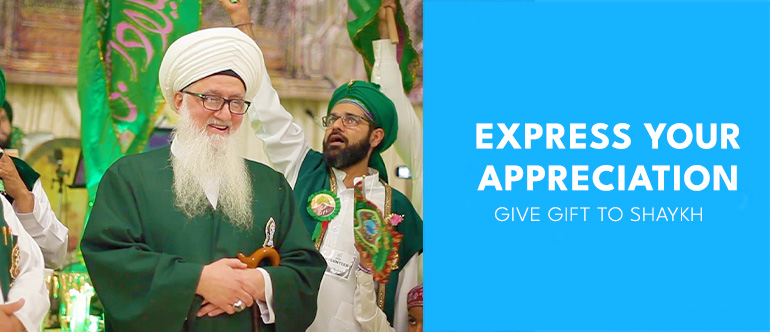


![Private: [ID: FyW7mBk8Xs8] Youtube Automatic](https://nurmuhammad.com/wp-content/uploads/private-id-fyw7mbk8xs8-youtube-a-236x133.jpg)